#hatred and warfare for instance
Explore tagged Tumblr posts
Text
Thinking about the Blessings and Curses in Futuran lore - and how V'exhness is supposedly guarding the Boxes of Blessings, which means they appear to still exist?
Thinking about how there are thirteen boxes over all - seven Blessings and six Curses, iirc? - and how there are thirteen commanders. (And then the secret fourth Shrine Maiden of Wisdom.)
Thinking about how there were twelve wars on Futuram before this one - that this is the thirteenth war, just like there are thirteen commanders, just like there are thirteen boxes.
Thinking about how thirteen is an unlucky number here - and how in some cases, that goes back to Judas as the thirteenth member at the Last Supper.
Thinking about how once Judas died, another apostle was called to maintain the twelve.
Thinking about how Paul would be added later as the thirteenth.
Thinking about how Shion was called the Second Coming by the Futurans before he was stolen by the human invaders; thinking about how Shion has known his entire life that he is meant to die and sacrifice himself for a greater cause that would mean the salvation of humanity.
....
These things are blatantly not the same.
...but I'm still thinking about them.
#musings#thl spoilers#the hundred line#Christianity#i do not think it's a one-to-one in any realm of etc.#but i'm thinking about how repetitive numbers are used in the Bible and how those numbers mean something#12 and 40 and 3#and i'm thinking about the construction of the futuran religion and how that thirteen pops up A LOT#i don't think the commanders are a complete one-to-one in terms of each of them is a paragon of a blessing or a curse#such that they're the boxes themselves#or parallel to it#(i DID think that and then went through the different titles and some of them are clearly curses#hatred and warfare for instance#but not as many as what /i/ would consider blessings#BUT THEN that's based on my own biases and not necessarily the futuran religion)#i'm just#/thinking/#and how kodaka etc. might be pulling on real world religions to build the fictional one within thl#i'm just....#hm#thinking
11 notes
·
View notes
Text
[“Ngo Dinh Diem thought to restore peace by reimposing strong leadership and suppressing the anger, the “egotism,” and aggressiveness of his people. His was the natural reaction of a traditionalist — or indeed of even the most “Westernized” Vietnamese in Saigon. The difficulty was that patriarchal rule in any form no longer carried the same authority. Under pressure from the West the society had “split apart” to such a degree that many Vietnamese no longer obeyed their fathers, much less their village chiefs or their self-created emperor.
Bent merely upon domination, neither Diem nor his officers would succeed in restraining their own soldiers from anarchic violence. The conflicts could no longer be suppressed. The dams had already broken of themselves, and no government could survive if it merely attempted to patch them up again. As Mao Tse-tung once wrote, “The force of the peasantry is comparable to that of raging winds or torrential rain. Its violence grows so rapidly, no power would be able to stop it. The peasantry will rip open all the chains that crush it; it will dash down the road to liberation.”
The revolutionary project of the NLF, like that of the Viet Minh and the Chinese Communists, was to use that released aggression as a creative force. The problem — the central problem — for the NLF was to provide a channel for that energy and to prevent it from exploding outward and destroying their own cause.
The containment of violence had, of course, always been the problem for Vietnamese governments at war, and traditional Vietnamese had considered it a task of extraordinary difficulty. Confucius once said, “Only when men of the right sort have instructed a people for seven years ought there to be any talk of engaging them in warfare.… To lead into battle a people that has not first been instructed is to betray them.” To Confucius “instruction” meant not military training, but training in virtue, or, in modern terms, politics. And the principal strategy of the NLF consisted precisely in political instruction.
In the course of their denunciation sessions, for instance, the NLF called upon the villagers to focus their “hatred” and “resentment” upon certain specific objects: the “feudalists” and “the American imperialists and their lackeys,” or, alternately, the “wicked tyrants” and “the reactionaries.” To most Americans the phrases sounded like nothing more than arid dogmatism: what, after all, could the words “feudalist” and “lackey” signify to villagers innocent of political theory? Nothing at all. And yet that was exactly the point: the words referred only to the people the NLF would later point out as examples of “feudalists” and “lackeys.” The words did not — and the distinction was crucial — necessarily indicate the local hamlet chief, the platoon of Popular Forces, or the landowner who lived in the village. They did not even indicate the stray American AID man or district adviser who might come to the village to give out bulgur wheat and cooking oil — unless the NLF cadres said that they did. In other words, while the NLF cadres allowed the villagers to give free, verbal expression to their hatred, they gave them no immediate object for it: certainly not a defenseless minority (such as the Jews in Hitler’s Germany) whom the villagers might murder as the scapegoat, the ritual vessel of all evil. And they did not on the other hand indicate an enemy that would appear overwhelmingly powerful to the villagers — an instrument of the will of Heaven. (As the young recruit, Huong, had said, “At first I hated only the Diem regime, then I hated its soldiers.” He had begun to hate the soldiers only after he had joined the Front and been persuaded that, as the war extended beyond the borders of his village, he need not be discouraged by the immediate presence of a superior force.)
By creating the enemy as an abstraction, the NLF gave itself the time to educate and discipline its recruits: the enemy would appear out of the distance of abstraction only when the recruits had learned to take discipline and to replace their “subjectivism” with a broader perspective on the concerns of the movement as a whole.”]
frances fitzgerald, from fire in the lake: the vietnamese and the americans in vietnam, 1972
25 notes
·
View notes
Text
is love inherently violent? with Ovid & Anne Carson
in Ovid's Amores 1.9, he draws the analogy between lovers and soldiers. in her essay Eros the Bittersweet, Anne Carson reflects on the "oneness" of love and hate in Sappho and Catullus. this begs the question, is violence an intrinsic part of love? must we hate in order to love, love in order to hate?
in his Amores, Ovid argues that all lovers are soldiers and draws several comparisons between the two. the ideal psychological qualities of loyalty, commitment, and passion are desired by both military leaders and puellae -- girls. soldiers march the long path to war, just as lovers will travel indefinitely through flooded rivers and snow for or to their beloved. Ovid argues, who but lovers and soldiers would travel through such conditions? quis nisi vel miles vel amans et frigora noctis et denso mixtas perferet imbre nives? who but lovers and soldiers keep vigil outside and even besiege doors? the similarities here are apparent. in this view, the act of love itself is an act of violence; to love and to seek love is to besiege and conquer. love cannot happen without some semblance of warfare, or so Ovid declares.
Anne Carson's first part of Eros the Bittersweet, aptly named "Bittersweet," examines the use of the term bittersweet describing love in Sappho and the Sapphic poetic tradition. She argues that ἔρος (eros), or erotic love, is inherently dual-minded -- not as a concept, but as a single event or instance. in the moment that love is experienced, it is bittersweet, or rather sweetbitter: γλυκύπικρον. in Sappho's view, eros is bipolar in that it seems to combine the two opposite poles of love and hatred. at its core, love is a paradox in which polar opposites intermingle and become one. hate cannot exist without love, and love cannot exist without hate. the two are inextricably combined, with one requiring the other to be present.
the lover's experience, especially that of a young adult, seems rife with hate, or at least non-feeling. it seems that love and disdain are in constant battle, rising against each other over and over. this battle in and of itself defines love as violent; love cannot win or even just exist without struggle, a struggle unseen. so, there is violence in love. love is not an easy thing, a gift given -- it is a constant push and pull, a fleeting emotion not easily pinned down and preserved like a butterfly in a box. militat omnes amans, all lovers are soldiers, engaged in an eternal battle. love is two-faced, γλυκύπικρον, two opposites wedded together.
9 notes
·
View notes
Text
Why We Must Remember?
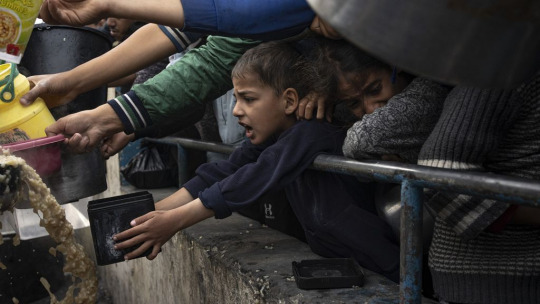
"It is not enough to fight for the living; we must also remember the dead and honor their sacrifices."
In a camp a small, frail 8-year-old child sitting scratching at his body, "There's no clean water to bathe with. I'm itching all the time," says Ahmad with frustration and sadness. Other children shun him because of his rash. Ahmad's mother, Fatima, sits by helplessly, saying, "He got a fever. The itching is constant, and he cannot sleep. The water is not clean, and we don't have the basics such as shampoo and soap."Nearby, 7-year-old Wahid sits in pain, pointing to a spreading rash. His mother adds, "Even walking is painful for him."These stories, which have been sourced from the UNICEF Palestine page, represent a fraction of the suffering of thousands of children caught in war zones like Gaza. They are exposed to diseases and indignities that no child should be subjected to due to a lack of clean water, sanitation, and medical care. As we discuss their struggles, similar stories unfold worldwide because people decide to keep silent.This is no isolated tale it reflects systemic failures in international policy and governance. The plight of children like Ahmad and Wahid shows how war spares no one, least of all the innocent, further underlining the need for the urgency of these problems.

"Amidst the shattered ruins, a child's innocence clings to hope, her eyes searching for a world that feels safe again. Her tiny presence speaks volumes of resilience in a space consumed by despair."
War has always cut human history, but rules of war have evolved in time. Ancient texts, such as the Mahabharata, talked about the destructive nature of war and provided ethical guidelines for how to conduct it: that it should be done in specified areas during daylight and not on civilians. Similarly, the Quran stresses the value of life, which includes strict prohibitions against causing harm to non-combatants or destroying resources.
In Christian theology, Augustine and Aquinas developed the concept of "just war," which insists that wars should have just causes and the purpose of restoring peace.In fact, history demonstrates the many occasions when they are violated. Modern war, from World War to present-day warfare, makes civilians into "collateral damage." Industrialization and technology have made war a force of impersonal, indiscriminate destruction. As Napoleon Bonaparte wrote, "The world suffers a lot from the violence of bad people because of the silence of good people." His words remind us of the moral vacuum that ensues when ethical lines are broken by ambition and hatred.
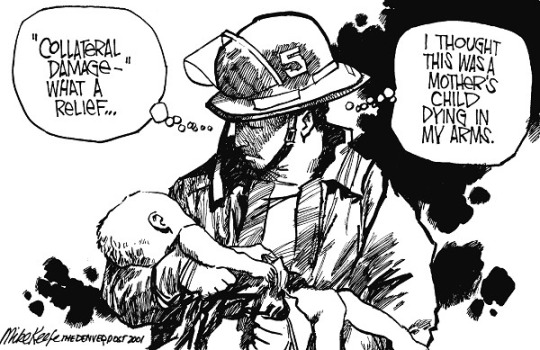
"A rescuer holds a lifeless child, haunted by the weight of innocent lives lost. Behind the term "collateral damage" lies unbearable human grief and pain."
Genocide represents one of war’s darkest consequences. Coined by Raphael Lemkin, the term combines "geno" (race) and "cide" (to kill). Lemkin’s advocacy, driven by the Holocaust’s horrors, led to its recognition as a crime under international law. Yet, genocide remains a tragic reality. From the Armenian Genocide to Rwanda, Cambodia, and Myanmar’s persecution of the Rohingya, these atrocities seek to annihilate entire communities, erasing lives, cultures, and histories. The United Nations (UN) and international laws established, such as the Geneva Conventions, are all designed to prevent war crimes and to protect civilians. Yet, their implementation often fails. For instance, it was during the genocide in Rwanda and Bosnia that UN failures in peacekeeping and accountability were institutional.
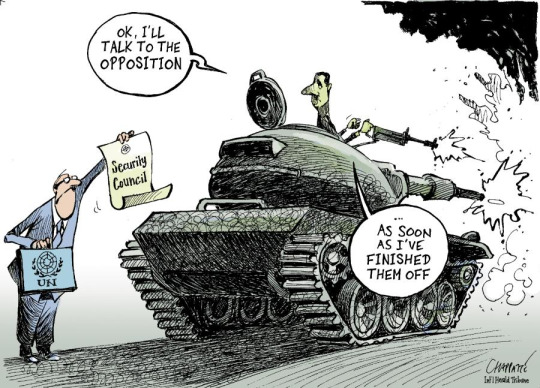
"The cartoon highlights the grim irony of war, where peace is postponed until the destruction is complete."
Edward Said and similar scholars attack colonial legacies that allow divisions and conflicts to continue. Said further explains in Orientalism how the colonial powers ensured that "us versus them" narratives allowed cycles of violence to be sustained long after the departs. Such divisions are prevalent in the Middle East and Africa, showing how history shapes the problem today.The plight of Gaza's children is a repeated failure. International bodies must prioritize availability of clean water, medical care, and education in those conflict zones. Otherwise, as Napoleon warned, "the silence of good men allows evil to triumph".
War's impact transcends generations, leaving physical, emotional, and cultural scars. The trauma experienced by children like Ahmad and Wahid reflects the broader consequences of conflict. Remembering these stories is not just a moral duty; it is a necessity for shaping a better future.As Napoleon Bonaparte reminds us, "Inaction breeds danger. Men who are responsible for good, responsible men, will stagnate in time, especially if they think themselves safe." The Rwandan Genocide killed nearly a million people in 100 days.
This is what happens when the world keeps silent. The same can be said about the Holocaust: horrors led to the Universal Declaration of Human Rights and "never again."Yet, as the wars in Syria, Myanmar, and elsewhere continue, we see history repeating itself. Studying war, trauma, and genocide allows us to confront these patterns. It teaches us about resilience and survival, as seen in children like Ahmad and Wahid, whose stories symbolize both suffering and hope.
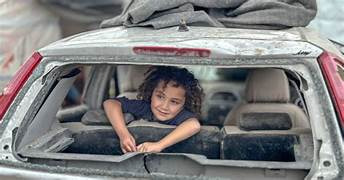
"Amidst the ruins of a shattered car, the child's gentle smile reflects resilience hope persisting even in the face of devastation."
In this blog series, we will focus on ancient, medieval, and modern periods of history to give closer attention to these themes. The first part will uncover some early origins of war and their ethical dilemmas along with the very first genocides in ancient civilizations. In the second part, we will assess how religion and power played central roles in medieval conflicts including religious wars and persecution of whole communities. Finally, the third section will take us into the present world by discussing the latest genocides, war crimes, and how technology is impacting contemporary warfare.
We trace here how the colonial powers carried on their "us and them" narratives and enshrined divisions even well after the colonialism phase was over, fuelling conflict. We will also see how these legacies of division continue to influence the conflicts we are seeing today-from the Middle East to Africa, where wars, genocides, and war crimes continue to rip apart communities and families. Case studies from India, Syria, Rwanda, and Sri Lanka among others will enable us to understand better how human beings, divided by historical forces, continue to divide themselves, perpetuating cycles of violence and trauma.
Within our blog series Faces of Conflict, we strive to shed light on the many layers of the reality of war and its consequences. Inspired by the Roman virtue of Veritas, where truth is the underlining point, our investigation finds and searches for the more sinister and harsh realities that arise within conflict, mainly with deep effects on the vulnerable victim, especially women and children. By sharing these stories and perspectives, we challenge silence and complicity, allowing injustice to flourish, as well as throw a light on how war crimes have evolved and caused havoc over time.
Through this journey, we move past recounting atrocities to identify tangible solutions that can deliver true justice restoring dignity, healing trauma, and promoting peace. It's through tracing historical patterns and analyzing modern implications we are seeking to find failures in the system and motivate accountability and reform. Recognizing the legacy of war crimes is not only key to honoring the past but for creating a future free of cycles of violence and injustice.
Frankel, J. (2024, December 6). War - Conflict, Causes, Consequences. Britannica. Retrieved December 10, 2024, from https://www.britannica.com/topic/war/Social-theoriesHow do you define genocide?
(2022, April 4). BBC. Retrieved December 10, 2024, from https://www.bbc.com/news/world-11108059
UNICEF State of Palestine. (n.d.). Unicef. Retrieved December 10, 2024, from https://www.unicef.org/sop/
2 notes
·
View notes
Text
When asymmetrical warfare is discussed, the focus is usually what happens on the battlefield. So, for instance, when the Viet Cong snuck out of the jungle to attack Americans or when Hamas terrorists leave their tunnels to shoot at Israeli troops or hide their weapons while they pretend to be innocent civilians, the battlefield is the subject of unequal or asymmetric warfare. But I want to discuss some other aspects of the asymmetries – the inequalities – in the current Gaza/Hamas war against Israel. These asymmetries are essential parts of the situation and culture of each combatant and so they appear off the battlefield rather than on it.
First, there is a striking asymmetry in numbers of people aligned with each side. There are only approximately seventeen million Jews in the world today and only one Jewish majority country. There are about six-and-a-half to seven million Jews in the U.S., about seven to seven-and-a-half million in Israel, and the rest are scattered around the world, with the largest concentrations of Jews being in France, the English-speaking countries, and then in smaller pockets throughout the world, including Argentina, Mexico, Brazil, and elsewhere. There are, however, approximately four hundred million Arabs in the world and approximately two billion (with a B) Muslims in the world, and fifty-two Muslim majority countries.
Those numbers matter not only regarding the ability of Israel to raise the money and troops to fight in its defense, but also because Israel’s enemies do not ever have to work hard to obtain a majority in the United Nations and to vote along religious-ethnic lines. Add to the Muslim countries in the United Nations the Russian and Chinese allies and puppets like Tajikistan and Khazakstan, and the “post-colonial” sewers that fester under ideologies of hatred of Western civilization, hatred of democracy, and hatred of Israel’s ally, the U.S. – countries like Myanmar, South Africa, Nicaragua, Malawi, and Chad. When Israel-haters and Jew-haters say that the whole world hates Israel, they are partly correct because most of the world lives under nasty regimes that have no freedom of speech, no freedom of religion, no free press, and no fair and free elections. The pressure of that asymmetry of numbers is always upon us.
Besides the asymmetry between Israel and much of the rest of the world because Israel is a liberal democracy, with its many freedoms, the contrast becomes even more stark with Gaza/Hamas. Even while at war, Israeli politicians are squabbling and posturing, Israeli newspapers are attacking the government’s policies and conduct of the war, reporters are exposing flaws in governmental operations, and people are “leaking” news to reporters so that there is a vast array of negative information, as well as positive information, about the Israeli leadership even during the war. In Israel even now there are public demonstrations against certain government policies. Contrast that with Gaza/Hamas which is a theocratic dictatorship run by an armed group that took power in 2006 and has never held another election. Because it is a dictatorship, there is no opposition party to challenge Hamas or to point to its flaws. Because Gaza/Hamas is a dictatorship, there are no newspapers whose editorial stance is to challenge the government’s policies or to advocate that the government take better care of its citizens. Because it is a dictatorship, there are no public discussions of policy, no demonstrations, no public admissions that mistakes have been made, no acknowledgement that the Gaza/Hamas government has ever done anything wrong.
Hamas does not have to respond or explain why they use the population of Gaza as they do because no one questions Hamas. When Israel makes a mistake or does something untoward, it is on the front page of every newspaper in the world. When Hamas shoots its own civilians, rapes, tortures, or murders a hostage in a tunnel, or steals money or other international aid intended for the population, it is a secret. While all of Israel’s imperfections are exposed, very few of Hamas’ are.
There is also an asymmetry in the conception of time that the combatants have. Because Israel is a democracy, its leaders have to respond to the public and respond to them at relatively frequent intervals. Politicians in democratic countries are usually focused on the next election in a year, or two or three. That conception of time as being related to the next election tends to make for short-range planning and pleasing the electorate now. That may be as much a problem for Israel’s most important ally, the United States, as it is for Israel. In a theocratic dictatorship with no elections, such as Hamas and such as Hamas’ major ally, Iran, which bars most opposition candidates from running for office, satisfying voters is simply not an issue. Hamas and Iran plan for the long term, free from any concern about what the citizens want.
Israel largely has to finance its own wars, although it does receive significant aid from the United States. That financing largely comes from internal taxation and some import duties. Israelis pay income taxes and a high “value-added tax” (VAT) to defend our country and provide necessary services such as schools and medical care. That is significantly different than Hamas/Gaza, which finances its war with money from Iran, Qatar, UNRWA, Syria, and Russia. Iran’s interest, like Hamas’, is in destroying Israel and killing all the Jews. Qatar largely shares that interest. Russia wants to embarrass the United States and have more influence in the Arab world. UNRWA, besides giving fake “refugee” status to third- and fourth-generation descendants of Arabs who left Israel in 1948, 1967, and at other times, teaches hatred of Jews and of Israel in its schools, gives “day jobs” to Hamas operatives and their family members so that Hamas does not have to pay their operatives a living wage, and provides schools and clinics which also sometimes double as Hamas weapons storage facilities, command centers, barracks, and entrances to the Hamas tunnels. By providing these schools and clinics, UNRWA relieves Hamas of what would ordinarily be the governmental responsibility of building and operating schools and clinics for Gazans. The “international community” thereby frees Hamas from having to pay for ordinary government services and allows Hamas to spend more on making war on Israel.
Last, and perhaps most important of all the asymmetries between the combatants, is their ideologies. Israel wants to live in peace and security inside her current borders. If Israel had that result, it would be the end of the almost constant warfare that Israel has suffered these last seventy-six years. Hamas, Iran, Syria, Hezbollah, Houthis, and other governments and quasi-governments want to kill all the Jews in the Middle East or, at least, expel all the Jews from the Middle East. They are not interested in peace. They will, at times, consider a truce or a ceasefire for strategic reasons, but not real, lasting peace. Different authorities in the field give different reasons for Arab and Muslim hatred of Jews and the little Jewish state (which Arabs and others try to disguise as “anti-Zionism”). One authority argues that because of their different value system, most Arabs do not believe in living together with other groups in peace and harmony but rather they believe that a group must either dominate or be dominated, oppress or be oppressed. They believe that Israel has dominated and oppressed but that they can right that wrong.
Another authority has contended that in Muslim doctrine, land has a character and that once it is conquered by Muslims, as Israel was in the seventh century, it always retains the character of Muslim land. Other thinkers in the field urge the simple religious explanation for the Arab hatred of Jews and unwillingness to live in peace with us: that Muslims believe that they have received the final word and prophecy as revealed by Mohammed and that we Jews have come to Israel, humiliated them in war, built a nation far more prosperous than any of theirs (at least until the extraction of large amounts of oil in some Arab countries), and have openly and explicitly rejected their prophet and their god. The one thing that is clear is that it is not about “Palestine,” a little corner of the world smaller than many American counties.
Despite those asymmetries between the combatants, there is one more that matters – an asymmetry that weighs very heavily in Israel’s favor. In all the polls and surveys of “happiness” by country, Israel consistently ranks as having a very happy population, much more so than any Arab or Muslim country. It is surely not because of material prosperity that Israelis feel this way. Most Israelis care about the land, about each other, about the fate of the Jewish people, and about Jewish tradition. I suspect that even many secular Israelis, deep in the recesses of their thoughts, no matter their outward protestations, believe that a benevolent G-d watches over the world and over us. What else could explain the happiness of a people constantly under threat, woefully outgunned and outnumbered in a hostile world?
So we will go on as well as we can. We have always faced asymmetries like these throughout our history. We have always been a comparatively small people, a people who had to make our way in a hostile world, a people who had to struggle to survive. We have gotten through these crises before, even if it has been painful to do so. We will get through this one also. Am Yisrael Chai.
4 notes
·
View notes
Text
'Flag In Exile' --A Review

The next chapter in the Honor Harrington series, Flag In Exile, finds Honor, well, in exile, after the events of the previous book, Field of Dishonor, made her a political liability for the Manticoran Royal Navy.
So, she goes to Grayson. After saving the life of their Protector, Benjamin Mayhew a couple of books previously: (see: The Honor of The Queen), she was made into a Steadholder and given her own land to develop and she throws herself into that, learning the ins and outs of the society and while her decision to not join the main Church on Grayson is controversial, she makes it clear that she respects the beliefs of the citizens in her charge and is always in the pews for Sunday services and people by and large respect that.
But, Grayson being Grayson (and still decidedly conservative), there are some people that aren't wild about it and they start to plot against her. Her big project for her steading and for Grayson are the development of the Sky Domes, which use Manticore's technology to reclaim the toxic land of Grayson and potentially make their orbital farming platforms obsolete at least someday and that's where her enemies strike, deliberately sabotaging a dome construction that kills scores, including many children, unleashing a wave of hatred and backlash against her.
In the meantime, this being an Honor Harrington book, she's called back to naval duty-- this time for Grayson and leads a fleet of reclaimed Havenite super destroyers against the People's Republic of Haven-- we see the return of Mercedes Brigham and Alfredo Yu-- both from The Honor of the Queen, even if the latter has defected to Grayson so serves as Honor's flag captain-- there's some tension between them initially, but they resolve it together, as Honor almost always seems to do and when Haven goes on the offensive, they make Grayson their target once again.
Honor's people, having figured out that the Dome collapse was sabotage, prepare to bring charges in a public meeting of all the Steadholders, but realizing that, her enemies make one final attempt to bring her down: shooting down her shuttle as it comes back down to Grayson and going one step further, and, finding out that she survived, trying to assassinate her directly in the flaming wreckage of her shuttle- the head of Grayson's Church, Reverend Hanks, intervenes just in time and takes the bullet for her and that proves to be the fatal undoing of her enemies. In the public trial, she names them and they, in turn, challenge her to a duel- with swords this time. Honor ends it with one, killing blow, and truth and honor are restored to her steading and Grayson.
In the meantime, there's a space battle. Honor takes losses, but manages to bluff her way out of a total disaster, coming out to meet the Havenite forces, making them think she's less damaged than she actually is. They break off and everyone lives to fight another day (or, at least until the next book.)
Overall: I'm starting to have some questions here. At what point does the trauma seriously catch up with Harrington? I get it- from a writer's point of view, you want to put your main characters through something, but Honor's been through the wringer quite a bit here. We saw some acknowledgment of it when she started one of the last books at home on Sphinx, but the Dome collapsed, still recovering from the loss of her lover, Paul, and the sheer galactic numbers of space warfare she's got to handle make me wonder about if she's going to crack at some point.
(That last point is really interesting to consider: in the space battle, I think she walks away with somewhere between 6K-15K dead, which is like WWI numbers-- the British suffered 19K dead on the first day of the Sommer, for instance, but in terms of modern warfare today-- the US lost about 3K in Afghanistan and we had lost 15K on one battle, you have to wonder what the public reaction would be. It's also worth noting that Afghanistan was not a peer/near-peer conflict for us, whereas a conflict with say, China, would produce far higher casualty figures. But the numbers: how do commanders psychologically handle that? That would be something interesting to explore, I think.)
I also want to say that these are starting to seem a little formulaic again, but I know better now. Every time I've thought that and wished for Honor to have a little more than duty, naval battles, and enemies plotting against her Weber has delivered in the subsequent volume. So, I'll hold off on my judgment until then. My Grade: *** out of ****
2 notes
·
View notes
Text
Warfare in particular is always political:
We see, therefore, that war is not merely an act of policy but a true political instrument, a continuation of political intercourse, carried on with other means. What remains peculiar to war is simply the peculiar nature of its means. War in general, and the commander in any specific instance, is entitled to require that the trend and designs of policy shall not be inconsistent with these means. That, of course, is no small demand; but however much it may affect political aims in a given case, it will never do more than modify them. The political object is the goal, war is the means of reaching it, and means can never be considered in isolation from their purpose.
........
War is a clash between major interests, which is resolved by bloodshed––that is the only way in which it differs from other conflicts. Rather than comparing it to art we could more accurately compare it to commerce, which is also a conflict of human interests and activities; and it is still closer to politics, which in turn may be considered as a kind of commerce on a larger scale. Politics, moreover, is the womb in which war develops––where its outlines already exist in their hidden rudimentary form, like the characteristics of living creatures in their embryos.
.........
That the political view should wholly cease to count on the outbreak of war is hardly conceivable unless pure hatred made all wars a struggle for life and death. In fact, as we have said, they are nothing but expressions of policy itself. Subordinating the political point of view to the military would be absurd, for it is policy that has created war. Policy is the guiding intelligence and war only the instrument, not vice versa. No other possibility exists, then, than to subordinate the military point of view to the political.
On War (1831) by Carl Von Clausewitz (trans. Micheal Howard and Peter Paret)
"don't make it political!" .... what proportion of death and suffering must occur before politics are involved. if this isn't political, what is even the point of any politics, ever. of democracy. the words are "by the people for the people." if i am going to be left alone by my elected representatives to "figure it out" - to undergo damage, hardship, fear. what the fuck did i elect them for. what was their job. the entire point is that they handle this shit. this is why we were supposed to be electing leaders.
poverty is political. misogyny is political. gun control is political. climate change is political. how much aid a community gets is political. what the fuck are you talking about. it's been political this whole fucking time.
3K notes
·
View notes
Link
0 notes
Note
OC ask game: 16, 18, 28 for Daphne (if you want)
For those who don't know, Daphne is Nyx's mom's sister and Clarus's wife in our Uncle Clarus AU!
I appreciate the chance to flesh her out some more!
16. do they have any pets? what do they call their pets?
She didn't before now, but now I'm gonna say she was sent with a pair of black and white coeurlaki (what I call the tiny tame coeurls seen in the Galahd concept art) that she named Nox and Luna as a kind of tease to her nephew and niece. Nox is called "Knocks" by everyone in Insomnia, though, as that's her favorite trick, and Luna is "Lookie Loo" and the like, because she's so curious. It started a brief trend in Insomnia for the cats, but most realized quickly that it takes too much energy to train them when they're kittens to not shock people or electronics. Daphne mainly gets away with it because she's used to training them and the Amicitia house is both large and old enough they can run around without hurting much.
Gladio does not remember that Luna and Nox are the coeurlakis' real name, and so never makes the connection with Lunafreya and Noctis, though Noctis does because he asked Daphne once about their names, and it makes him more determined to befriend them and give them treats.
18. their opinion on lying, stealing, and killing?
Putting a cut, because of course I always get long on this question...
She's generally against all three, but willing to make exceptions when it comes to protecting the people she loves.
She's come to accept that a little bit of social lying is normal in Insomnia, and is willing to pass along some white lies to help Clarus's operations or to cover for him or the kids if they have to duck out for something, but generally frank honesty is her go-to, especially one on one. She accepts that not everyone feels the same way, but she keeps track of lies she catches and slowly freezes out the habitual liars unless she has figured out a reason for the lies. (Lying about being abused, for instance, is unfortunate but understandable, and she often gives signals that she knows you're lying, but she doesn't hold them against people the same way. At least not after the first one, when she realized with Clarus's help what the cost was. Wisdom sometimes doesn't come easily. Abuse happens in Galahd as well, of course, but she knew fewer people there and generally knew them better, and that made spotting it and dealing with it different.)
Stealing is divided into two types: stealing from within the group and from enemies. Stealing from within the group is either an act of hatred/retribution against someone else or part of community sharing, where things just circulate as needed, especially within a cohort. You just go gather the tupperware that accumulated at your friend's house from the parties when you run low, that sort of thing. Sometimes you leave a riddle teasing them, and that can start decades long jokes and trying to figure out who it was. Stealing from enemies is just part of survival, and usually a demonstration of cleverness. Alternative warfare. In-cohort stealing/sharing gets applied in Insomnia as sharing information, equipment, and jewelry, etc with Aulea and Regis and Cor (if possible). Revenge/Enemy stealing gets applied to getting funding for the Crownsguard and worthy causes from other groups who also want the funding.
Killing beasts and food animals is normal, if sometimes difficult. Killing humans is something she's been able to avoid. She considers defense as generally a good excuse, if it has to happen, and she thinks she would kill for her kids or her family, but she's glad she doesn't really have to think about that much in Insomnia. It's safe, after all. She knows Clarus has killed, and that even though he'd do it again it bothers him, which sort of solidifies her opinion.
28. how do they show that they care about someone? how do they express that they don't like someone?
Daphne is a defender. She defends her loved ones from teasing, from ignorance, from loneliness or feelings of inadequacy. She's always right there, beside or in front of you, when she sees you struggling. She's had to learn to blunt that or do it indirectly in Insomnia, but she's adaptable. For her marriage, this usually takes the form of fighting on the fronts Clarus can't, because he's only one person.
She's also definitely the feeding friend. Food solves a multitude of problems. She doesn't always make the food herself, but she makes sure you get what you need.
For acute offenses, she'll tell you directly what she didn't like and why. If she just doesn't like you and can afford to, she freezes you out. You get no information about her or her family. She ignores your jokes and offered points of connection. She is more willing to defend others against you, even if she doesn't know them, she assumes you probably deserve it. If she can't do this because of politics, she just sabotages whatever of yours she can get away with, sometimes quite pettily. She does try to account for the splash damage, though.
Okay! Not sure how much of that made sense, but it feels right so I'm sticking with it. Daphne is very brave and sure of herself, and even though those traits don't always work out well for her in Insomnia, she learns quickly. She does her best to support her friends and family by fighting for them where she can with what weapons she has. She is also a little bit of a math nerd and is good at accounting and following number trails and uses that to her advantage, especially to balance her tendency toward bluntness.
I think Iris tried to go the proper lady, indirect action route partially because she saw that her mother struggled when she was blunt and had more success being sneaky, and partially to reflect well on her father, who leans into protocol as a general rule, especially after her mother died. She does grow to be more like her mother as she gets older, though, for good or for ill.
Gladio followed Daphne's footsteps of blunt communication with important people in his life (ie Noctis) and just...working around people who don't seem to want to cooperate (also Noctis) but as a younger kid didn't get that bluntness needs kindness as well to temper it, and working around people is for enemies rather than allies, and by the time he learned that had damaged his relationship with Noctis somewhat. As they get older, the boys start to work it out, though. Gladio got his love of reading from his dad, but he enjoyed sitting with his mom while she poured over ledgers, muttering to herself, and reading beside her, and she learned a bit of literature analysis to help him tear the stories apart for what he liked and didn't like, because it was where she could meet him on reading.
Thanks for letting me ramble. I really do enjoy Uncle Clarus, and look forward to writing more of it with you!
3 notes
·
View notes
Photo

In addition to all this, take up the shield of faith, with which you can extinguish all the flaming arrows of the evil one. Ephesians. 6:16 Arrows played a significant part in ancient battles. Warriors barraged their opponents with hundreds of flaming arrows.In spiritual warfare, the devil fires flaming arrows at us as well. For instance, it might be an arrow of fear, impure thoughts, hatred, or some other thing designed to destroy us. The shield that quenches these fiery darts is the shield of faith. - faith in God as our Father, in Christ as our Redeemer, in the Spirit as our Sanctifier- faith in all the promises of God, above all, His promise to protect us.
75 notes
·
View notes
Text

Be Angry, but Do Not Sin - St. Hesychios on Spiritual Warfare and the Incensive Power of the Soul:
Along with the humility, perfect attentiveness, and prayer, Hesychios discusses the importance of the “power of rebuttal” in spiritual warfare. In a previous post, I began to touch upon the importance of hatred of sin or one’s sinful thoughts for progress in spiritual life and as an essential aspect of a true and abiding love of God. Love of God and for that which is holy will lead us to hate sin or sinful thoughts and seek to set them aside as soon as they become evident to us.
This view, it may be helpful to know, arises out of a specific anthropology; an understanding of the powers of the human soul (the appetitive, intelligent, and incensive powers) based upon the tripartite division formulated by Plato in Book IV of his “Republic” and accepted by the Greek Christian Fathers. According to the glossary of the English translation of the Philokalia, the Appetitive aspect (epithymikon) is the soul’s desiring power, the Intelligent aspect or power (logistikon) is the ruling aspect of the intellect or its operative faculty and the Incensive power (thymikon), which often manifests itself as wrath or anger, but which can be more generally defined as the force provoking vehement feelings. The three aspects can be used positively, that is, in accordance with nature and as created by God, or negatively, that is, in a way contrary to nature and leading to sin. For instance, the Incensive Power can be used positively to repel demonic attacks or to intensify desire for God; but it can also, when not controlled, lead to self-indulgent, disruptive thought and action..." (Vol I, p. 358).
It is the incensive power of the soul that experiences extreme emotions. Thus, it can be positive or negative. The positive use of the incensive power is to repel evil thoughts or rebuke demonic attacks; that is, the power of rebuttal. To put it another way, we use the incensive power correctly when – and only when – we are angry at the things that anger God. However, having said this, the writers of the Philokalia are clear and consistent in stating that the incensive power was given to us as a defense against sin.
Here are two very good examples: Using the example of temptations to unchastity, Evagrios writes, “Our incensive power is also a good defence against this demon. When it is directed against evil thoughts of this kind, such power fills the demon with fear and destroys his designs. And this is the meaning of the statement: ‘Be angry, and do not sin’ (Ps. 4:4)” (On Discrimination, section 15, p. 47). To “be angry and not sin” is to be angry at sin, beginning within oneself. This is why St. Isaiah the Solitary could write, “Without anger a man cannot attain purity: he has to feel angry with all that is sown in him by the enemy.” (On Guarding the Intellect, section 1, p. 22)
The Fathers understand St. Paul well who wrote: "We wrestle not with flesh and blood..." The enemies whom we are to hate are not our fellow men, but the demonic and unnatural thoughts which attack our day-to-day lives. To these, the Fathers often applied the words of psalm 137: “O Daughter of Babylon, doomed to destruction, happy is he who repays you for what you have done to us-he who seizes your infants and dashes them against the rocks.” The "children of Babylon" are the actions born of hatred, of cowardice, of greed and lust, and all the ugly and unnatural thoughts one might have. We are to guard (nepsis) the heart and mind and with the sword of the incensive power drive our unnatural thoughts and temptations away.
Often we enter into the battle unarmed and Hesychios tells us that without prayer “we have no weapon to fight with. By this prayer I mean the prayer which is ever active in the inner shrine of the soul, and which by invoking Christ scourges and sears our secret enemy.” We must not be timid or passive in our response. Again, Hesychios writes: “The glance of your intellect should be quick and keen, able to perceive the invading demons. When you perceive one, you should at once rebut it, crushing it like the head of a serpent. At the same time, call imploringly to Christ, and you will experience God’s unseen help” (Philokalia, Vol. 1, p 165).
Trusting in Christ, humble, prayerful, and having silenced our hearts, we must ever be on the watch for the enemy. Hesychios provides the following image: “If you wish to engage in spiritual warfare, let that little animal, the spider, always be your example of stillness of heart; otherwise you will not be as still inn your intellect as you should be. The spider hunts small flies; but you will continually slay ‘the children of Babylon’ if during your struggle you are as still in your soul as is the spider; and in the course of this slaughter you will be blessed by the Holy Spirit” (166).
However, as noted above, while the writers of the Philokalia and Hesychios urge us on in the battle and encourage us to be zealous, they present us with one very important caveat. Although the incensive aspect of our soul is God-given in order to repel demonic attacks and to intensify our desire for God and His will, if not controlled and transformed by grace and ascetic practices, it can easily lead to self-indulgent and destructive thoughts and actions. And so, Hesychios tells us: “The incensive power by nature is prone to be destructive. If it is turned against demonic thoughts it destroys them; but if it is roused against people it then destroys good thoughts that are in us. In other words, the incensive power, although given as a weapon or a bow against evil thoughts, can be turned the other way and used to destroy good thoughts as well, for it destroys whatever it is directed against” (167).
We are to be “incensed” - enraged and infuriated toward all within us that is contrary to love and goodness and fearlessly and swiftly wield the sword against all unholy thoughts. But in the process we must avoid the temptation to raise this sword against another - the fruit of which is only malice and violence. Hesychios describes the danger with utmost clarity: “I have seen a spirited dog destroying equally both wolves and sheep” (167).
11 notes
·
View notes
Text
Okay I just need to go on a rant about Whirl because I love him he might just be the most tragic character in the entirety of MTMTE and considering the candidates that’s a pretty hard position to cinch. Some of this is gonna have mentions re: self harm, suicidal tendencies/ideation, overall bad coping mechanisms etc so if that’s not your cuppa please scroll on.
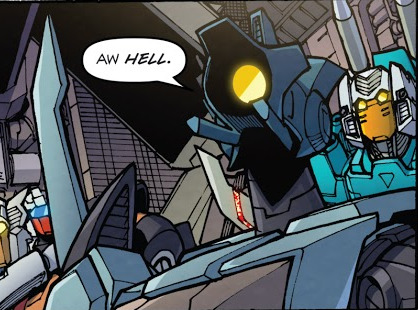
This gets long so here’s the obligatory read more.
Let’s write “tragic” in flickering neon letters with the fact that Whirl’s first appearance in MTMTE, dropping the titular “how to say goodbye and mean it,” is a personal soliloquy delivered as he’s in the midst of constructing his own funeral pyre. Whirl is lost, directionless, trapped and unwilling to be such in a postwar environment. But how did we get here?
Whirl is without a doubt a driven character. In the prewar functionist society, he had no qualms switching careers, risks be damned. Whether he’s always had a knack for disobeying authority or was simply driven by passion or both isn’t elaborated on, but he’s got a hell of a hardheaded streak that’s impossible to ignore. When destroying his business wasn’t enough to deter him from further rebellion, the Senate was happy to turn him into an empuratee and destroy not only the opportunity but the capability of continuing to rebel by pursuing his passion. This is what I’d personally consider the big ‘whump’ moment, less so the use and abuse as a pawn that followed but the point of trauma at which we begin to see Whirl’s psyche begin to twist.
From this point forward we see Whirl in and out of prison, let loose when he can be useful to someone else’s ploy and otherwise incarcerated for a buffet of offenses. No longer able to be constructive and having little if any control of his life, Whirl becomes aggressively destructive. In response to having everything he aspired toward ripped away from him, permanently, he builds a mental defense of bitterness and anger and paves over his black hole of self worth with a veneer of outright assholery. It’s here that he bares his metaphorical fangs and pushes - with gusto - anyone who might even suggest they’re trying to appeal to reason or get close to him as an individual.
It’s hard to imagine, given even subtly different circumstances, that Whirl would not side with the decepticons for the war. While he’s single-handedly responsible for radicalizing Megatron towards violence, the ‘con intent at the start of revolution - that movement in society should be possible and a caste system based on alt mode is unethical - aligns quite nicely with what he’d already aspired to do with his life. His conscription to the side of the autobots is just another instance in which his autonomy is cast aside.
Whirl is a tool. Whirl had a passion for watchmaking, but now he can’t, so his new passion is violence. Whirl is a gun and someone else has always told him where to point and all he’s ever been given for his cooperation is the blame of pulling the trigger. Whirl is an asshole, Whirl is unpredictable, Whirl isn’t a mech anybody would ever think twice about saving - the answer would always be no. Whirl wants to die. Whirl only wants to die on his own terms and he’ll be damned if he’s going to keel over under the orders of someone he doesn’t respect, for a cause he doesn’t believe in.
A few years of this sort of treatment would be enough to drive anyone insane, let alone the millennia of warfare he suffered through. Worse yet is the one time he found a group, a team that was known for the unorthodox and taking on the big messy challenges, the Wreckers kicked him out. Whirl was too much for the mechs that were too much and there’s no way in hell that doesn’t still sting.
That’s how we get here:
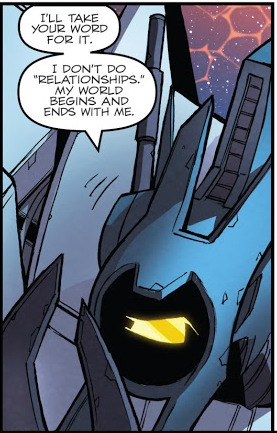
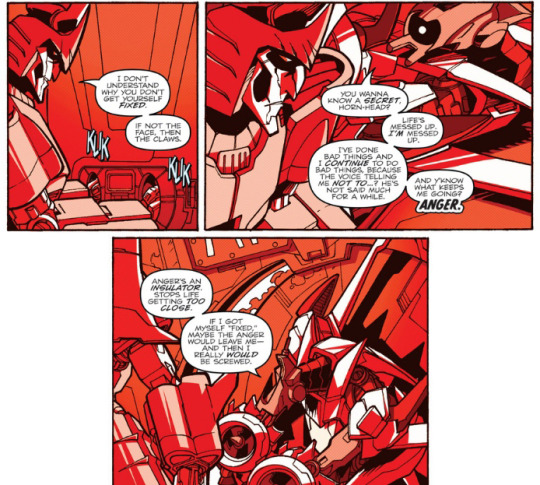
Whirl defends himself through isolation from others. He can’t be hurt by others if he never lets them close enough to be hurt by. In a hypersocial society, he has no close long-term friends, he is one of the few with no roommate aboard the Lost Light. He made himself as unpalatable as possible. He’s crass, he’s volatile, he makes it clear with every word and action that Whirl is first, you don’t mean anything, I’d leave you for dead in an instant..... But that’s not true, is it?
Whirl is shown being completely, dramatically, self-destructively caring throughout the series. Between risking his life for the scraplet colony disguised as a protoform, participating in an untested spark jumpstart to save a life, coming up with a plan to rejuvenate Tailgate’s spark, and performing a spark transplant surgery on Megatron - without whom the world would never have been even a fraction as cruel to Whirl as it had been - Whirl is far from the most selfish character in the series. It’s in his nature, however, to deny such, to the point where he more than likely believes his own narrative that he’s irredeemable, self-absorbed, invincible, degenerate, and neither capable nor deserving of close interpersonal relationships.
It’s also how we get here:
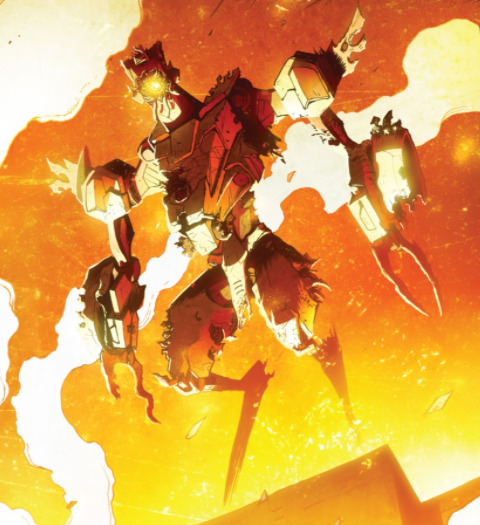
Whirl is one of the characters that we more frequently see in a state of disrepair. He fights passionately and recklessly, with no regard whatsoever to whether or not he makes it out of a scrum with all his limbs intact. Injuries like these, and those that he experiences elsewhere in the series, would put other mechs out of commission through pain alone, but as long as Whirl is conscious he doesn’t stop until the fight is over.
As depressing as it is to think that Whirl is simply at this point accustomed to extraordinary pain, it’s even moreso to think about the more likely concept that he wants to be hurt. Whirl doesn’t have control of a lot that happens to him, but do you know what he does have control of? Who he chooses to shit-talk. More often than not we see Whirl being blatantly disrespectful of his superiors, and some of the more dangerous mechs aboard the LL. While obviously his intent when insulting Ultra Magnus isn’t to start a fight, harping on Drift (and subsequently getting cold clocked) or Cyclonus is a little more self-destructive in nature.
While Whirl has been in therapy, we see during the encounter with Fort Max that he’d shared very little of what he actually considered traumatic with Rung. With no material to work with, Rung wouldn’t have been able to give Whirl instructions or advice as far as a healthy coping mechanism, and so I’m firmly of the belief that Whirl goes out of his way to get himself hurt as a way to have a vague sense of control.
On his actions and guilt:
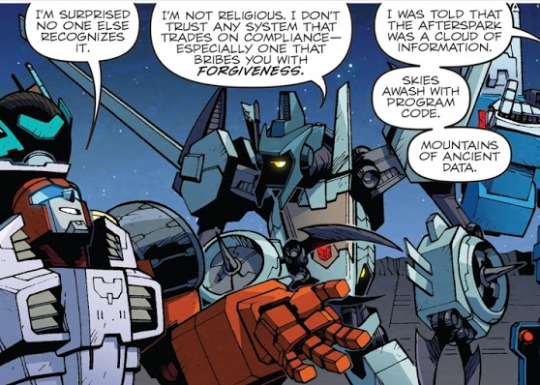
Whirl is immensely guilty. When he’s overcharged, he admits that everything feels like his fault - and unfortunately a lot is. Whirl believes he’s the bad guy, and he’s willing to take the fall for actions that others might find immoral. There’s a lot Whirl has done that he’ll likely never forgive himself for, even if he garnered the ability to start forgiving himself for the small things, but the character he’s created for himself has been part of him for so long that it’s near impossible to tell where to draw the line between caricature and his genuine self.
At this point in time, Whirl is not capable of improving himself without external assistance.
He has accepted (however wrongfully) that he is not cared about, trusted, wanted, or respected.
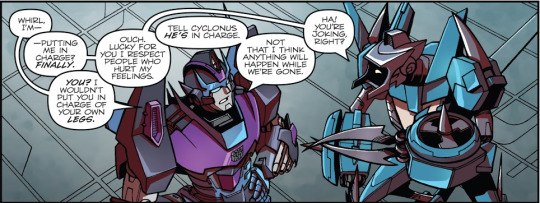
His assumptions become self-fulfilling prophecy as he - consciously or not - works to perpetuate his image. Whirl is a dick, he’s unfazed by anything anyone says about him, if someone is insulting him they’re probably right, why bother arguing unless it’s with the intent to get in a fight? He doesn’t pay attention to others, he doesn’t pay attention to himself, nothing that anybody could say could possibly make a difference.

Right? Right?
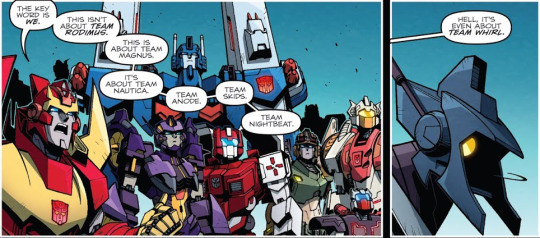
Wrong. Part of what makes Whirl so heart-wrenchingly tragic is that it is so incredibly clear that nobody has ever told him he mattered. Rodimus throws out what could be interpreted as a snide remark, “even the crazy bastard makes a difference,” and that aside sticks with him. Millions of years of warfare, of being a tool to use, an expendable soldier, a rabid dog to throw at their enemies, and not once did someone turn around and say he was anything good. He’s been thanked for saving lives, for contributions, for individual acts, but his reaction to Rodimus really cements in my mind that nobody has ever said that he, that Whirl, was important.

Whirl is a broken character. He’s subsumed by his own self-hatred that he perpetuates and justifies with a mask of cruel indifference and aggressively abrasive snark. He’s alone, by what he thinks is his own choice but is really a horribly misguided attempt to keep himself safe. He’s got no potential for growth unless someone wants to force their way through his defenses in order to help him find the line between who he is and who he pretends to be in order to keep from being hurt. Whirl is terrified of abandonment, and guarantees that nobody will ever be able to leave him by never letting them come close to begin with. He’s not a good person, he’s violent and callous and has little regard for the consequences of his actions, but he is that way because of the life he was forced to lead. He falls into consistent patterns because he craves control, even if those patterns are self destructive. It’s proof of the little growth he was allowed during the course of MTMTE/LL that after their quest was over, he didn’t attempt suicide again but instead got into the revolving door of incarceration for petty offenses.
All in all, Whirl is one of the saddest characters in any media I’ve consumed and please someone get this despicable bastard helicopter a new therapist and a stiff drink
382 notes
·
View notes
Text
10 reasons to love | Touya Todoroki

warning: A lot of Endeavour slander in here... read at your own risk. I take no criticism on endeavour.
𝟙𝟘 𝕣𝕖𝕒𝕤𝕠𝕟𝕤 𝕥𝕠 𝕝𝕠𝕧𝕖 | 𝕋𝕠𝕦𝕪𝕒 𝕋𝕠𝕕𝕠𝕣𝕠𝕜𝕚

Reason 1: He’s a villain. Ain’t nobody stealing your ass and if someone is stupid enough to do it mans would literally burn the world down to get you back. Dabi don’t give two shits about other people. But for you he will kill everyone to get you back. Also dating the villain isn’t that bad. You will literally be there whole world. They will always come home to you. They don’t have fangirls like heros do.

Reason 2: This man is SMART. He is very cautious not to divulge too much information which makes a great villain. They don’t need to know your plans that how things get ruined for the villains. While fighting endeavour he was smart enough to retreat when Miriko came.

Reason 3: This man has been through hell. Literally psychological warfare. and yes it fractured his psyche but he still is high functioning. He doesn’t spiral even when up against Endeavour (I fucking hate this bitch) the person who broke it in the first place. He is very calculated about when he revealed his identity which is impressive to say the least. Speaking purely from a psychological perspective this is a rarity, people who fracture like this normally spirals and goes on a killing spree with no control. However dabi is able to contain his composure and attack and tackfully retreat that’s impressive.

Reason 4: If he believes in something. He believes with his heart and soul. This man will fight tooth and nail for what he believes in even if society doesn’t agree. When he says he wants to kill all fake heros he is saying this with his full chest. However unlike Stain he doesn’t see growth in peoples character and he places his own bias on them (This is in no way me side with endeavours bitch ass). Even still he will fight for what he believes in which is honorable.

Reason 5: Another reason is Quirk is Awesome. The mans flames are hotter than Endeavour (take that hoe). Endeavour could never. But anyways he can literally hotter than the sun fam. hotter than the SUN. He also has amazing control over something that is literally destroying his flesh. The pain tolerance is immaculate.

Reason 6: Dabi is a great villain. His ambition is purely fueled by anger and the wrongs done onto him by someone who was suppose to nourish and protect him. he is cunning enough to plan ahead for all outcomes. he is also meticulous when strategies it may seem like his plans are half cocked but in all actuality everything that happens he allows. Dabi doesn’t trust very easily so he is always cautious and observant. He also weaponizes information against his opponents i.e his identity and Hawks identity *lowkey spolier but not really. Also he’s powerful and knows when to back down and regroup unlike my baby shigaraki.

Reason 7: Another reason is he is not an abuser because of how endeavour treated him he definitely will not abuse anyone. (Killing is not abusing btw. It’s murder. I’ve had to explain this in class before lol. Thought i’d just clear it up before someone comments it.) He wouldn’t intentionally inflict pain on someone else. Even when he taunting someone it’s never psychological torture. He would never want to be like his father. He wants to destroy his father and never be like him. (as you should 😌)

Reason 8: Okay time to flip him and think about his potential as a hero. He would be a great hero and Shoto would literally worship the ground he walked on. Bakugou would be outmatched and he would take U.A by storm and I mean that. He however would denounce his father and probably never speak to him again after execling so well. You know how we have emancipated minors that would legit be Touya and Natsuo. Touya would try to be the best to spit Endeavour. He would become the number one hero just to be like suck it old man. You. lost. (as he should 😌). As much as everyone like to forget Touya cared about his siblings alot so he would have helped Shoto control his powers.

Reason 9: If he wasn’t pushed to be separated from his family. He would be a family man through and though. Like I said before everyone likes to over look the fact that Touya loved his siblings and protected them from there tyrant of a father. Touya would cared about Natsuo even as a villain but his hatred for endeavour outranks past familial loves.

Reason 10: Touya has a lot of potential to grow as a person and as a character even if it’s for good or bad. I get that some people can’t get past him killing people and I am in no way justifying what he did but Touya is more than just that action and there was a lot of potential snuffed out by trauma and abuse. But he still has potential to be amazing. Even though he sent someone to kill his brother he still cares for him. If the Todoroki’s (not including endeavour and his fuckery) band together and try to talk to him and defeat him (They have to defeat him or he won’t listen. It’s a reassurance thing. His inferiority complex won’t let him listen to anyone weaker than him. Like for instance if Midoriya talked to him after pummeling him he would listen might not apply it but he will take it into consideration.) To be honest Touya is very much so a cause of his environment. The love he knew quickly turned into abandonment and solitude. It’s actual heartbreaking. Touya basically did die during that fire at least his psyche did.

Wow I didn’t even explain why I love him. I love his potential not his actions I am a big believer in people can change if you understand them enough you can sympathize and help. Touya Todoroki is a perfect example of how a parents bad action reflect on the child. I love that. The entire todoroki family is a beautiful portrayal of abuse and the effects it can have on someone.

A/n: Fun fact about me but most of the anime men I simp for are normally born on january 18 or january 19 and my birthday is january 20 so. I don’t know what that means 😂. But theres a useless fact about me.
#bnha#bnha midoriya#bnha bakugou#bnha todoroki#bnha bakugo katsuki#bnha shoto#bnha dabi#bnha izuku midoriya#bnha tamaki#bnha shoto todoroki#bnha shigaraki#tomura shigaraki#villains#heros#aizawa#mirio#nejire#denki#denki kaminari#mina#jiro#monoma#neito monoma#touya todoroki#dabi is touya#mha#mha kaminari#mha todoroki#mha dabi#mha shigaraki
25 notes
·
View notes
Text
Legal Systems Very Different From Ours (Because They Do Not Exist)
(I forgot Scott had already done this, lol)
AZAREN
There is the land of Azaren, far to the north; a rugged, windswept country, it was settled by hardy explorers in an ancient age of migration, who have always been disdainful of central authority, and permit themselves to be governed only to the most minimal extent. As a consequence of this skepticism of government, there is also a general skepticism of public law. All law in Azaren--except the few scraps of administrative and procedural law necessary to operate the government--is private, and there is no criminal law. All disputes between parties are resolved by what we would consider in other countries civil suits, governed by strict rules involving standing. Theft, arson, even murder may all go unpunished, unless there is an interested party willing to file suit to obtain redress. The Azarenes by and large consider this system exemplary of freedom and justice, and we cannot help but admit an attraction to the cleanness of its philosophy.
A key component of Azaren justice is the principle that no entity is above the law; no entity, however powerful, is so majestic that it is immune from suit. This meant that gods, natural forces, even celestial bodies have been sued (though principally in more superstitious days long past), and where by the weight of evidence, or the simple failure to appear, have been duly issued fines, which remain on the public register of debts waiting to be paid. And naturally, Azaren countenances no doctrine of state or sovereign immunity. This principle, especially due to the absence of public law, extends also to relations between Azaren and other states. Naturally this principle extends to sublunary bodies like Azaren's own government: Azaren recognizes to doctrine of state or sovereign immunity, and not a few political revolutions have been wrought through cunning arguments in the courtroom. And note also that Azaren conducts no foreign policy as a unified whole--for that would require an intolerable tyranny imposed on her people, that is to say some form of tax to pay the salaries of a diplomatic corps--but what individuals and groups of individuals see fit to conduct. So from time to time, an individual or group of individuals together will decide some foreign state has wronged them, and, as is Azarene custom, will petition their courts for redress; and despite the diplomatic protestations of the representatives of that government, that any such proceeding is a clear violation of precedent in the community of nations, that by dint of its sovereignty no state may be sued in the courts of another, the Azarene court will hear the suit. And should the plaintiffs prevail, an order will be issued for the recovery of damages.
And it is for this reason and this reason alone that Azaren has any armed force: in case of a judgement entered against a foreign government, the militia of Azaren is authorized to confiscate property--in Azaren or abroad--belonging to that government (and if need be, its citizens) until enough has been seized to cover the amount owed. Whereupon, whatever the state of the field of battle, however close the foe is to total capitulation, they return to their ships instantly and retire to their home country.
GKNAI
The land of Gknai is ancient, possibly one of the longest-inhabited regions in the world; and as it is nestled deep in often-overlooked mountain valleys, it has enjoyed a history of uncommon peace and tranquility, well-fortified against the ambitions of neighboring princes; it has indeed earned its epithet of Many-Fortressed-Gknai; and in later millennia, this reputation for indomitability has served by itself to safeguard its borders.
As a consequence of its long, long history, it is said, Gknai is uncommonly bound by the pageantry of Tradition. Just as other countries have monarchies that have withered away into irrelevance, performing a few desultory functions of government under the strict control of their ministers, Gknai has its own titular kings and princes. Indeed, it has them by the wagonload. The difficulty of warfare in the region and the bombasticity of ancient aristocrats means that every valley is thick with Kings and Over-Kings, and Lords President, and Grand Dukes, and even Emperors. Most Sublime Hierophants tend their vegetable patches across the road from Thrice-Exalted Tyrants, and the multiplication of titles is not helped by the fact that under Gknaian traditions, every child inherits some share of the honors of their parents.
The Gknaians have never had a single political revolution to sweep the old order away, only centuries of incremential change. Therefore, each of these titles, in the abstract legal sense, still has some privilege attached to it, however slight it may be. Nor, if they wished to abolish their cumbersome system, is it clear how they might legally do so: there is no legislative authority in Gknai but custom, and for every amendment to the law some precedent, even if very weak, must be found that may be expanded and elaborated upon and carefully argued for until it is generally agreed upon in the whole land. Gnkaian legal codes incorporate much of this commentary, and a Gknaian law library is thus a fearsome thing indeed.
The most curious relic of Gknaian tradition is a form of trial, still in general use, called gopi-gai ogmo, or Trial By Endurance. It was argued by an ancient Gknaian scholar that wealth, strength, and even legal persuasiveness were poor proxies for the righteousness of a cause, and so poor criteria for deciding a lawsuit. For with wealth often comes prestige, and undue influence over the public; with strength, assured victory in the trials by combat; and a well-spoken orator might convince even the best of judges to decide a case in contravention of the law, if his eloquence and flattery are sufficient. Better, said this scholar, to align public interest with individual preference, and a hint of utilitarianism: clearly, the side that *wishes* to win more, should prevail. And how to decide that more efficiently, than with a test of endurance?
This is the form of the test: a hillside of a valley is chosen, one warm in the morning and cool in the evening, but not too hot or too cold; and the plaintiff and the defendant are seated upon it, gazing down at the valley below; and the judge and officers of the court withdraw to observe. That is all. Whomever remains seated and motionless the longest is judged to desire victory more. To stand, speak, cry out, laugh, smirk, or fall down is to forfeit the case. Neither of the parties may be spoken to; neither may be disturbed in any way. The only modification ever made is this: in matters deemed especially urgent, sometimes the parties are made to stand instead.
Judgement, naturally, usually takes days. One especially notable figure, Hrakal the Vexatious Litigant, widely feared for his tolerance of boredom and inclement weather, successfully lodged no less than three dozen lawsuits against his neighbors, until he met his match in Tatavru the Stubborn. That particular proceeding lasted more than two weeks, until an out-of-season snowfall gave Hrakal frostbite, and caused him to relent. I have also heard of a legendary conflict over a spite-fence in the valley of Upper Dabbar, where, it is said, the parties sat immobile for *three years*, sustained by surreptitious nighttime meals and the kind of intense mutual hatred known only by neighbors who share a property line. Another interlocutor I spoke with, an older woman, said that this was a corrupted version of an older tale, altered for believability's sake. In fact, she said, the dispute was *never* resolved. The parties sat immobile until the vegetation grew thick on their laps and shoulders; and if you visit a certain hilltop in Upper Dabbar, you can still see them, two seated figures covered in grass that have now become part of the hill.
BOSSUL
In the city of Bossul, all important questions must be settled by a consensus agreeable to all parties. Although apparently cumbersome, this system has many virtues. The government of Bossul enjoys approval ratings usually seen only in the most tyrannical of dictatorships, and though the city's martial fury has been inflamed many times, it has never actually gone to war, for there have always been one or two heads cool enough to refuse to support it. Alas, every occasion of government is nearly interminable as a result: even the most trivial meeting of the least prestigious committee can drag well into the night; and nothing about the culture or institutions of Bossul does anything to restrain the impulses of busybodies or know-it-alls who have, in every other culture on the planet, driven such consensus-driven systems into the dirt. Yet Bossul's persists, for uncertain reasons.
One, perhaps, might be the custom of Utabani-mo-Kalutabani, which might very roughly be translated into English as "Agreeing To Disagree." When a consensus *cannot* be reached--for instance, in an intractible legal case--a temporary truce may be enacted in the form of Utabani-mo-Kalutabani. In short, each side continues to live their life, pretending that they have won. Thus, from time to time, you may explore the city of Bossul and find such oddities as two different families, each on the opposite side of an inheritance dispute, living in the same apartment and pretending the other does not exist. You may find an employee, who has sued for wrongful termination, coming to work every day at a company that insists she does not work there. You may even, on occasion, find someone walking the street as a free man, whom the police insist that they currently have in their custody.
It is a strange custom, and one cannot help but wonder if it is of any practical use at all.
MOZICK
Mozick is a small island in the Hraspedain Sea, rainy in winter but temperate in summer, which like Gnkai has a deep respect for the usages of its past. In Mozick, this is something of a religious conviction, for their society is organized around the pronouncements of the Great Oracle of the Smoky Mirror, who lived and died more than a thousand years ago.
Such was the inerrancy of the Oracle's predictions (it was said), that the Oracle was trusted utterly in settling disputes and prosecuting criminals. Usually, the Oracle heard arguments before pronouncing judgements, but this was considered a formality; many times, a judgement could be given as soon as the parties entered the courtroom. And such was the faith the people had in their Oracle, that they feared what would become of their society when she died; so she set down in an enormous volume a list of judgements--thousands of them--in cases yet to come. They named no parties, nor any details of the case: only Guilty, Not Guilty, Liable for a sum of 400 Mozickian drachmas, etc.
The procedure in Mozick is thus: when cases are brought before the court, the time and order of each filing is carefully noted. Once a year, amid solemn ritual, the Book of Judgements is opened, and a judgement for each case is read off, in order. It is an article of faith in Mozickian law that the judgement is never wrong, though at times the wisdom of the Oracle has, the Mozickians admit, seemed... startling. There was, for instance, the legendary case of Uckmar the Arsonist, caught in the act of burning the Temple of Ytrabel-Sheh; the sentence read aloud before the prosecutors was "Defendant to go free, be compensated 10 drachmas." But, the legal scholars carefully explain, Ytrabel-Sheh was the god of rain, and an unusually wet summer that year had caused the slugs to flourish in Uckmar's garden, devouring his tomatoes. The arson was, perhaps, justified, or considered just compensation; the 10 drachmas were for emotional damages. So the careers of legal scholars in Mozick are made, harmonizing the decisions of the great Oracle with the principles of justice.
A careful accounting of judgements is important to the system--once it was discovered that one judgement had accidentally been used twice, necessitating a redistribution of three years' worth of punishments and fines; fortunately, no death penalties had been handed out. But the Book of Judgements is finite. And one day--a day that soon will be in the expected lifetime of Mozickian lawyers now practicing--those judgements will run out. What does this portend? Will Mozick be conquered? Sink beneath the sea? Will--as some quietly hope--the Oracle return? No one knows. But each year sees more of the judgements used up than the last, and soon the book will be empty.
66 notes
·
View notes
Text
193 impressions/rant
I'm probably the only one, but I'm actually lowkey disappointed in this chapter.
One of the key elements that sets akatsuki no yona apart from most shoujo manga (and a manga created in 2009 no less!) is how morally grey and fleshed out the key characters are. Soo won is one of my favourite characters in this genre EVER because of his drives and ambition paired with his childhood bonds that he ultimately tosses away. And he isn't even the protagonist lmao
So when I read this chapter and saw that Yuhon was literally just a brute I was disappointed af. It just seems like poor writing to me. The situation with the priests could have been WAY more grey. Yuhon, whilst a bit more aggressive than most when it comes to imposing his will (literally kidnapping Yonhi and punching his brother) still demonstrated rationality and the ability to reason. The best example for me was his talk with Yonhi's mother. He listened to her tale of Hiryuu and reasoned that no matter the circumstances, he would still care for Yonhi and hope that a cure of the illness would be found.
That's why the burning of the priests literally makes no sense to me. Even if he dislikes them, it doesn't mean he isn't capable of I don't know, an interrogation??
And lmao don't even get me started on Yonhi. Girl had the capability to state an unpopular opinion about Il amongst literally strangers (Yuhon and the court ladies/concubines) but she doesn't have the guts to tell Yuhon that maybe he's going too far? Perhaps she is too terrified of him after the death of her mother, but if that was the case I would have preferred to see at least a few more panels explaining that.
This whole chapter just seems like a justification of Yona's words in Xing, which is so disappointing. If that was the case there is was no need for 3ish chapters to make that point.
The only was I can see this disappointing tibit on Soo-won's parents being redeemed is if Kusanagi decides to actually delve back into grey territory by demonstrating how brutal other nations can be. Maybe other provinces in the Kai Empire or the Nomads actually being scary af threats, and perhaps a callback to the trafficking that occurred in Awa? If Kusanagi can do that, it will definitely make this meh as chapter worth it, because I think Yona needs to understand that in her time, the warfare is simply another means of keeping one's people safe, even if it is 'a cycle of hatred' in most instances.
Probably will rant more later but I'll leave it here lmao I have too many feelings abt this chapter
41 notes
·
View notes
Text
The Character Forge: How to Play as Damien Lavey in DnD 5e

Today I’m making a build for everybody’s favorite spicy red baby from Monster Prom, Damien Lavey. So showcase how bold and fun you are over a bowl of knives amid the romantic glow of arson, as we conspire to dance with the devil on prom night.
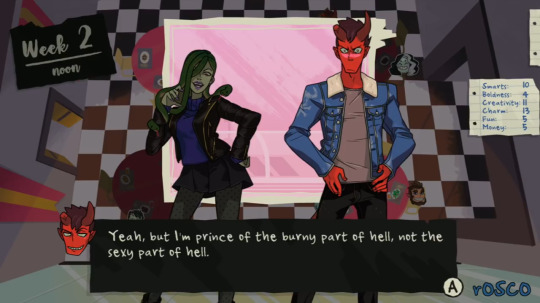
The Prince of Hell
First things first, we need to be a Tiefling. Asmodeus is the standard cut of Tiefling and gets +2 CHA and +1 INT and the ability to cast Hellish Rebuke and Darkness once per long rest without using a spell slot. However, another option for subrace is Zariel Tiefling, which get +2 CHA and +1 STR and the ability to cast Searing Smite and Branding Smite. Choose whichever you feel is better for your build.
For Alignment, this guy is a psychopath, but then, most of the characters in Monster Prom are horrifyingly and endearingly amoral. We’ll call him Chaotic Neutral because just as much as he’s wiling to break the law to help you, he’ll also do it just to amuse himself. Or just for the fun of breaking the law.
For background, Damien is the Prince of Hell, and his fathers conquered Hell together. So, while it’s tempting to label him a Criminal, he’s a Noble.
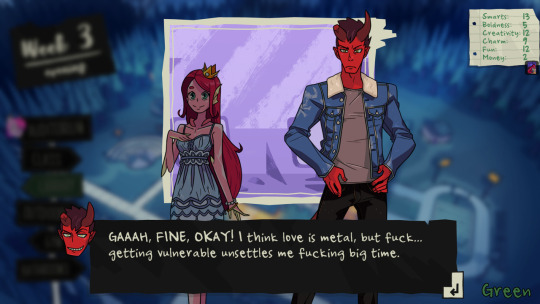
Skills and Abilities
Damien appears to be completely immune to fire, and while he starts fires with matches and gasoline, there’s also an instance where he throws fire at people from the top of a stolen food pile among other times, so he has some limited use of fire magic. There is an instance where he jumps out of a pizza oven, which even the Narrator is uncertain whether Damien can teleport through fire, or if he was just waiting there in the oven for your character to show up. He has also drank straight fire, and has a literal furnace in his stomach that causes him to eat a lot of food very quickly.
Damien seems to be magically resistant to mortal wounds. While competing with Polly over whose flasks contains better stuff, Damien has a flask of radioactive absinthe, and he finds a fist fight to be a turn on which suggests that he must be supernaturally durable.
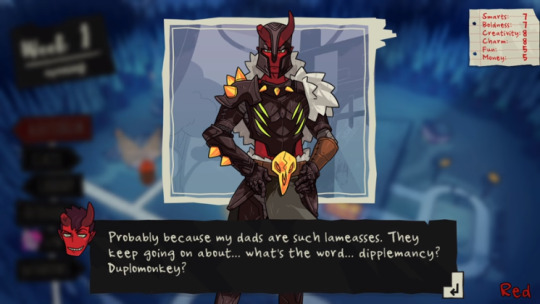
The Class Rebel
Barbarian Damien is an angry guy with a love for violence and Polly states that his talent is hitting things. As a Barbarian, Damien would become an embodiment of rage and savage warfare, but at the penalty of losing access to his spell options while raging. Desert Storm Herald: When you rage, you create a 10 foot aura that wreathes you in flames. Creatures within your aura take Fire damage, you gain Fire resistance, ignite flammable objects with your bare hands, grant your allies Fire resistance while within your aura, and retaliate against anyone who dares hit you with a searing Fire counterattack. Zealot: Your rage is fueled by a vow of unholy piety to wage war for your dark lord. This subclass lets you imbue your weapon attacks with added Necrotic damage, be revived from death without costing the necromancer material components, reroll a failed roll while raging, fill allies with unholy fury to give them advantage, and straight up refusing to die.
Paladin Whenever you encounter Damien at the auditorium, his designated costume appears to be some sort of black knight. Damien loves warfare and fighting, even claiming that his actual battle attire is really just 700 knives held together with barbed wire. Paladins are usually beacons of moral purity, there are some dark variants of this wholesome class. Conquest: Conquest Paladins are focused on crushing opposition to their tyrannical rule. Considering you cheer Damien up about being the heir to Hell by reminding him he can wage war as king, this could work nicely for him. You become so terrifying that it actually hurts those who are afraid of you, punish those foolish enough to hit you, and become an avatar of combat. Oathbreaker: While Damien has never made an oath to break, Oathbreaker Paladins create an aura of hatred that empowers fiends and undead, resist bludgeoning, slashing, and piercing damage from nonmagical weapons, and become such an embodiment of rage and fear that being near you causes mental trauma on your enemies.
Sorcerer Most fire spells are only listed as being in the Sorcerer and Wizard spell lists, and Damien obviously has strong fire associations. Pyromancy: Your bloodline has strong associations with fire. You gain resistance and later, immunity to fire damage, and your fire spells deal added damage.
Warlock Most of the time when a character fits Warlock, the lack of spells is usually a major hang-up, but luckily, Damien’s use of magic is extremely limited to being able to throw fire. Also, in an adorable side pic by the crew, Damien is seen playing DnD with Zoe, Liam, Oz, and Slayer, and he seems to be dressed like a spellcaster, which to me looks more like a Warlock than anything else. Fiend: An alternative option to Sorcerer’s selection of fire spells, and as the Prince of Hell, of course his powers come from infernal sources. Hexblade: Hexblade Warlocks get the ability to swing with CHA instead of STR for weapon damage, as well as letting him bind the souls of his victims into being his slaves. While Damien doesn’t have a specific special sword, he does like knives and swords, so he likely has one that matters enough to him to bother forging a bond with it.
For this build, an Oathbreaker Paladin is very useful, as it lets you add your CHA mod to your melee weapon attack, making Hexblade irrelevant because this boost also increases the power of other fiends, letting you raise and then empower an army of the damned. So, by coupling this with a Fiend Warlock, your melee weapon attacks can deal your normal sword damage, with both your STR mod AND your CHA mod to make you an extremely deadly infernal warrior while still giving you access to fire magic and demonic powers.
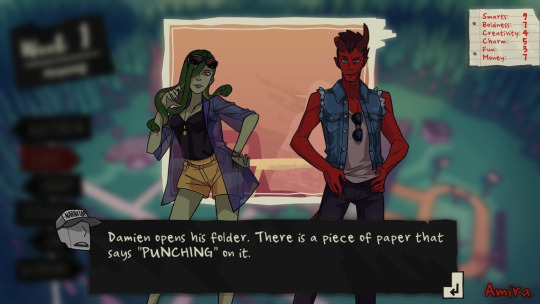
Stats and Proficiencies
All of your casting options cast with Charisma, and having a high CHA stat also makes you better at lying and scaring people, so it’s a good stat for Damien to have a lot of. Strength is the other stat you’ll want maxed out so that your Oathbreaker subclass can make you an avatar of pain and carnage. After that, a high Constitution is important so that you can shrug off a stab wound or pierce your nipple with a handgun instead of a piercing gun without dying like a noob. You’ll want a decent Dexterity, but it’s not super necessary for the build. Wisdom and Intelligence will get dumped though. Damien’s not even close to top of the class, and it’s pretty easy to fool and coerce him to believe something, so he’s not exactly wise either. Then again, his strength is punching things, and that’s what his build is focused on doing.
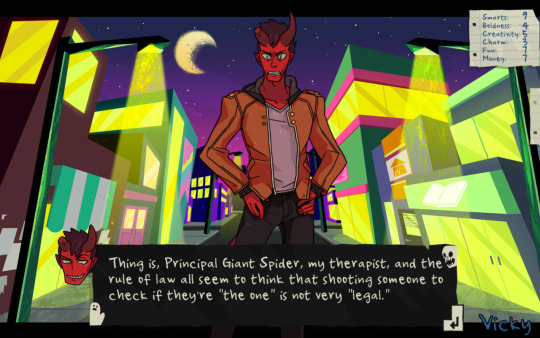
Name: Damien Lavey Race: Zariel Tiefling Background: Noble Alignment: Chaotic Neutral Class: Oathbreaker Paladin (8) Fiend Warlock (12) Base Stats: Strength: 20 (+5) Dexterity: 12 (+1) Constitution: 16 (+3) Intelligence: 8 (-1) Wisdom: 8 (-1) Charisma: 20 (+5) Saving Throws: Strength: +10 Dexterity: +6 Constitution: +8 Intelligence: +4 Wisdom: +10 Charisma: +16 Combat Stats: HP: 172 AC: 16 Speed: 30 Initiative: +1 Number of Attacks: 2 Hit Dice: 8d10, 12d8 Proficiency Bonus: +6 Passive Perception: 9 Dark Vision: 120 feet Proficiencies: Athletics History Intimidation Persuasion Skills: Acrobatics: +1 Medicine: -1 Animal Handling: -1 Nature: -1 Arcana: -1 Perception: -1 Athletics: +11 Performance: +5 Deception: +5 Persuasion: +11 History: +5 Religion: -1 Insight: -1 Sleight of Hand: +1 Intimidation: +11 Stealth: +1 Investigation: -1 Survival: -1
Damage Resistances Fire Condition Immunities Disease
Equipment: Chainmail: It’s not 700 knives held together with barbed wire, but it’s interlocking bits of metal, so close enough. Longsword: It’s just a prop, but Damien uses one in the play. Deal 1d6+13 Slashing Damage +5 Necrotic Damage on a melee weapon attack.
Paladin Feature: Fighting Style Dueling: One-handed weapon attacks deal +2 damage.
Warlock Feature: Pact Bond Pact of the Blade: You forge a bond with a weapon, and gain the ability to summon and dismiss it at will. The weapon counts as magical.
Warlock Feature: Eldritch Invocations Agonizing Blast: Eldritch Blast deals +5 damage on hit. Devil’s Sight: 120 feet of normal and magical darkvision Fiendish Vigor: Cast False Life on self at will. Gain 1d4+4 temp hit points. Relentless Hex: Teleport within 5 feet of a cursed target as a bonus action. Superior Pact Weapon: Your pact weapon deals an added +2 damage. Lifedrinker: When you hit with your pact weapon, deal +5 Necrotic damage.
Warlock Feature: Mystic Arcanum Investiture of Flame
Spell Slots 1st (4) 2nd (3) 5th (3)
Damien’s Spellbook
Cantrips 2nd Level Booming Blade Branding Smite Create Bonfire Crown of Madness Eldritch Blast Darkness Sacred Flame Scorching Ray Thaumaturgy 3rd Level Toll the Dead Fireball True Strike Summon Lesser Demons 1st Level 4th Level Burning Hands Elemental Bane Command Shadow of Moil Compelled Duel Summon Greater Demon Hellish Rebuke 5th Level Hex Flame Strike Searing Smite Hallow Wrathful Smite Infernal Calling Negative Energy Flood
Actions:
Divine Sense Detect Celestial, Fiend, or Undead. Detect Holy or Unholy energy. Lay on Hands Pool of 40 HP to distribute or 5 points to cure poison or disease.
Features:
Aura of Hate You, Fiends, and Undead within 10 ft add +5 to weapon damage Aura of Protection You and allies within 10 ft. get +5 on saving throws Channel Divinity: Control Undead An undead within 30 feet of you must pass a WIS throw or obey you for 24 hours. Channel Divinity: Dreadful Aspect Choose any creature in 30 feet to become afraid of you for 1 minute on a failed WIS throw. Channel Divinity: Harness Divine Power Use Channel Divinity to restore a used 1st Level spell slot. Dark One’s Blessing Gain 17 Temp HP upon reducing a creature to 0 HP. Dark One’s Own Luck Once per rest, add 1d10 to a skill check. Divine Smite Sacrifice a spell slot, deal (x+1)d8 radiant damage, +1d8 on fiends and undead. Dueling Fighting Style Add +2 to one-handed melee weapon attack damage Fiendish Resilience When you finish a rest, choose damage to resist. Mystic Arcanum Cast Investiture of Flame once per long rest without spell slots Position of Privilege You belong in high society, lowborn bend over backwards to make you comfortable, and you can get an audience with other nobles.
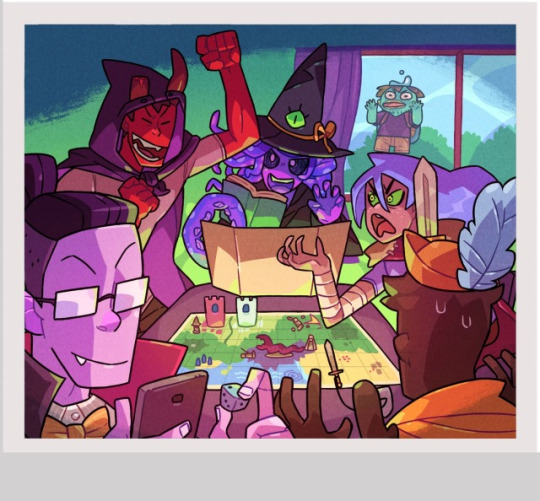
With this build, Damien is an avatar of carnage, dealing anywhere from 20-25 damage with every melee weapon attack and getting two attacks per turn for 40+ damage, he’s absolutely phenomenal at slaughtering his enemies. Quite fitting for this adorkable pyromaniac. How do you feel I did with this build? Would you build Damien differently? Which player character do you like to chase the Spicy Red Baby with? I’m partial to Brian x Damien. And do you have a character you’d like to see me build? I take requests. And as always, thanks for joining me in the Character Forge, where heroes are made.
#dungeons and dragons#damien lavey#monster prom#monster prom damien#damien#dnd#5e#dnd 5e#fifth edition#5th edition#warlock#paladin#spicy red baby#lavey#demon#tiefling
332 notes
·
View notes